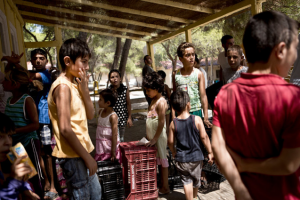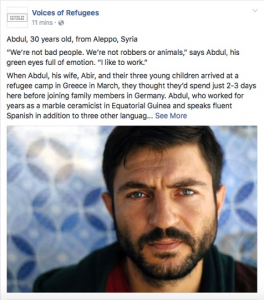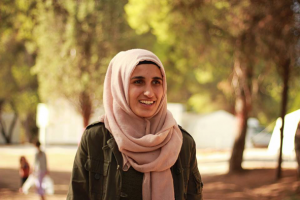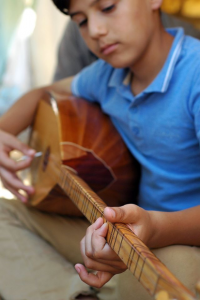By Ariel Pinsky
A mounting refugee crisis in Europe has resulted in over 57,000 people trapped in a chaotic limbo on the mainland of Greece and its islands near Turkey. The crisis is largely a result of a growing number of people fleeing their homes in Syria, Afghanistan, Iraq, and other Middle Eastern nations ravaged by political turmoil and unending violence.

Greek authorities are struggling to tackle the growing humanitarian emergency that has worsened in light of dwindling resources at the makeshift refugee camps – a problem compounded by the failure of the European Union (EU) to assist asylum seekers and process their applications expeditiously.
Two millennials volunteering on the ground at the Ritsona refugee camp in rural Greece, Shayanne Gal and Claire Veale, are currently pioneering a collaborative project called Voices of Refugees with the aim of drawing international attention to the current crisis. Their goal is to share the “raw, beautiful, distressing, and profoundly human stories” from the refugees’ own perspectives.

Founder Shayanne Gal, 23, has an intense passion for photography and cross-cultural communication. She taught English in Chile upon graduating from the University of North Carolina in 2014 and more recently interned in Israel to practice digital design with a cohort of international students. She has been volunteering at the Ritsona camp for over two months aiding in crucial food and supply distribution. The project’s other co-founder, Claire Veale, 27, was born in France but moved to London to get her Masters in Violence and Conflict as well as Development and Humanitarian Emergencies from The School of Oriental and African Studies at the University of London (SOAS). Claire has been in Greece for over three months volunteering and conducting research in various refugee camps.
Shayanne and Claire agreed to answer the following questions together via email from the camp:
- Brandon Stanton, founder of “Humans of New York,” told NPR, “I loved taking photographs at the time, and I struck upon this kind of crazy idea that I was going to go to New York and stop 10,000 people on the streets and take their portrait, and create kind of a photographic census of the city.” What comes to mind when you read this quote?
This quote resonates with us in a lot of ways – in relation to this particular project, but also to our mutual passions for photography and for interpersonal communication in general. The idea of creating a “photographic census” of a specific population strikes us as an ambitious, but very meaningful method of understanding the makeup of human energy of a particular place in time. In a way, Voices of Refugees is tackling a similar ambition – but as opposed to creating a census, we are giving the refugees stranded in Greece a voice to create their own “census”, and instead of analyzing the population of one specific city, we are providing a new perspective for global understanding – the project doesn’t focus on where the people are located, it focuses on the fact that at the forefront, they are all people – with individual perspectives and stories that pertain to the topic of human displacement in today’s global society.

- What are some initial challenges you faced in attempting to execute this project? What are some current challenges you face?
In our initial attempts to execute the project, some of our biggest challenges included approaching the residents and asking them to share their stories, scheduling the interviews, and overcoming language barriers/ ensuring adequate translation. We knew that this project would require a lot of personal and emotional energy from the refugees, and we wanted to make sure that they all felt absolutely comfortable with sharing their stories online and with opening their stories up to us. As this crisis is tremendously vulnerable, our main priority was making sure that the camp residents would not be putting themselves, or their families who stayed behind in the countries they’ve fled from, at risk. When conducting personal interviews, we make sure the residents are in a comfortable place, or a private space, with the support of friends and community members if needed, for them to feel at ease sharing their story.
Regarding scheduling – as the current volunteer work we conduct at the refugee camp is very time-consuming, and of course, our main priority is our work and contribution to the residents at the camp, it has sometimes been difficult to find the sufficient time to dedicate to approaching the residents, conducting interviews, taking photos, etc. Not only were we working around our own schedules, but also had to take into consideration the residents’ and translators’ schedules. Hand in hand with this challenge, we have also been faced with sharp language barriers, and it has not always been easy to find translators who were available for the scheduled interview sessions, mostly conducted in translated Arabic and Kurdish. We have nevertheless received the help of several very helpful translators, and many residents themselves, who speak English and have offered to translate.
As time has passed, we’ve developed stronger relationships with the residents at the camp, and with the release of the online platform, have received a lot of positive feedback and willing engagement for future interviews.

- What inspired you to create Voices of Refugees? How long have you had this vision?
We are both passionate about photography and about using photos and visual media as a medium for expressing ideas, advocating for social change, and creating collective experiences.
Prior to arriving in Greece and meeting each other, we were both individually interested in learning more about the refugees and their personal experiences that led them to their current situation – displaced by violence and war, stranded along their bleak journeys to a new life. It was partly what brought us to Greece originally, alongside our motivation to volunteer in the camps.
Upon our first encounter in Greece, we both expressed an interest in documenting the crisis in a different light, as well as sharing a deep passion for photography. The portrayal of the refugee crisis in the general media, we felt, lacked the human perspective, and after spending some time on the ground at the camp, we both felt compelled to share the simultaneously raw, beautiful, distressing and profoundly human stories of the people we had shared our hours with each day.
We instantly clicked on the idea of creating a platform that would provide an insight into the lives of the refugees at the camp, which quickly expanded into what is now Voices of Refugees, a collection of unique and personal stories on human displacement, acting as a collaborative global series that goes far beyond the refugee camp we volunteer at.
Currently, we both conduct interviews and take photos together as well as separately. We collaborate on the writing and editing of the stories and photos, and we remain in constant communication about future plans and schedules for the platform. We also welcome submissions of stories and we encourage anyone with a unique voice to add to this narrative, to submit, photos, stories, or videos at v.of.refugees@gmail.com.

- What do you consider one of your favorite stories you’ve recorded thus far?
Although all the stories we have recorded so far have a unique element that make each one extra special to us, we feel that sharing the experiences and stories of women is especially rewarding, because their voices are not always heard. In refugee camps especially, women do a lot of hard work that is often overlooked – such as washing clothes by hand, cooking family meals, cleaning the shelters, and taking close care of the children. They sometimes have to go through intense, life-changing experiences such as pregnancies and giving birth in the camps, or throughout their journeys to Europe. These stories are raw, breathtaking, and beautiful, and they portray the incredible resilience of women faced with unimaginable hardships – a perspective we feel is especially important for us to shed light on.
- Why do you think refugees want to speak to you?
We think that refugees understand how important it is that Europeans, North Americans, and humans all over the globe have access to personal perspectives from this crisis and get to understand the conditions they live in and the realities of their journeys in pursuit of refuge and a new life. During the interviews, many refugees express that they have direct messages they want to share with the world, about their hardships and their journeys, but also messages of solidarity and peace with all those who engage in the project. They see the platform as a way to directly communicate with the world online and have their voices heard on a large, public scale.
- How and where are the actual interviews conducted, and how are people chosen?
Every Voices of Refugees interview is conducted at the refugee camps or places of dwelling of the refugees depicted. Naturally, through our daily interactions with the people at the camps, we have developed relationships with residents who have expressed interest in participating in our project and in sharing their voices online. We do not have a special selection process, as we are only interested in sharing as many voices as we can, and in allowing the residents to participate willingly and freely in this exchange. We ensure that the objectives and end results of the interviews are properly explained to each participant, and that we get the informed consent to publish their stories online. Respecting concerns of protection and privacy is a crucial part of the success of this project.

- How did you decide on the format for sharing the refugees’ stories?
In deciding on the format for sharing the refugees’ stories on our platform, we tossed around a few ideas. At the forefront, we wanted to illuminate the human aspect of these stories above all else, and felt that in combining our passion for photography and writing, we are able to put a name to a face, and a voice to a story. We wanted to illuminate the fact that behind the word “refugees”, are just humans, and they each have unique stories and perspectives to share. We think that our format of a portrait photo accompanied by quotes and narrative text gives an inclusive insight into the individual stories we share.
We are also both open to incorporating multiple other mediums to share these voices, ranging from photos and texts to audios and videos that we feel would provide dynamic perspectives to the unfolding of the refugee crisis on the ground. We are accepting submissions of external stories in any of these formats, and we hope to provide insight into the refugees’ lives through any means we can.
In terms of our online platforms, we have chosen to collect all of the stories on our voicesofrefugees.tumblr.com page, where viewers can explore all the stories posted and see an overview of the photos. We also invite everyone to visit and like our Facebook page at www.facebook.com/vofrefugees to keep up with all the latest stories as they come in!
- What are your individual future plans? What are your long-term goals for Voices of Refugees?
Shayanne: My upcoming future plans circulate around continuing to contribute to and assist refugees throughout this dire crisis in any way possible – for the remaining months volunteering at a refugee camp in Greece, as well as beyond in my next endeavors back in the United States. I aim to continue using photography, digital media, and journalism to promote and advocate for causes I believe in and to pursue sharing collective visual experiences through my travels across the globe.

Claire: My immediate future plans consist of travelling further in Greece and in relevant countries, to meet more displaced peoples in various settings, in order to portray different realities and share more stories on Voices of Refugees. I hope to continue working with photography and writing during my travels, and work for social justice along the way.
Both: In the long-term, Voices of Refugees will ideally gain more followers and engagement as a platform and become a place for not only the stories we collect, but also for stories contributed by other photographers, journalists, and refugees themselves around the globe. The vision is to continue to tell these stories from different outlets, and create a collective space for narratives on human displacement in our current global society. We are aiming to create a community where the contributors and the readers will be able to engage on stories together, and hopefully make a positive impact in shaping the way the realities of the refugee crisis unfold around the world.
All photos in this article, unless otherwise noted, are accredited to Voices of Refugees.
